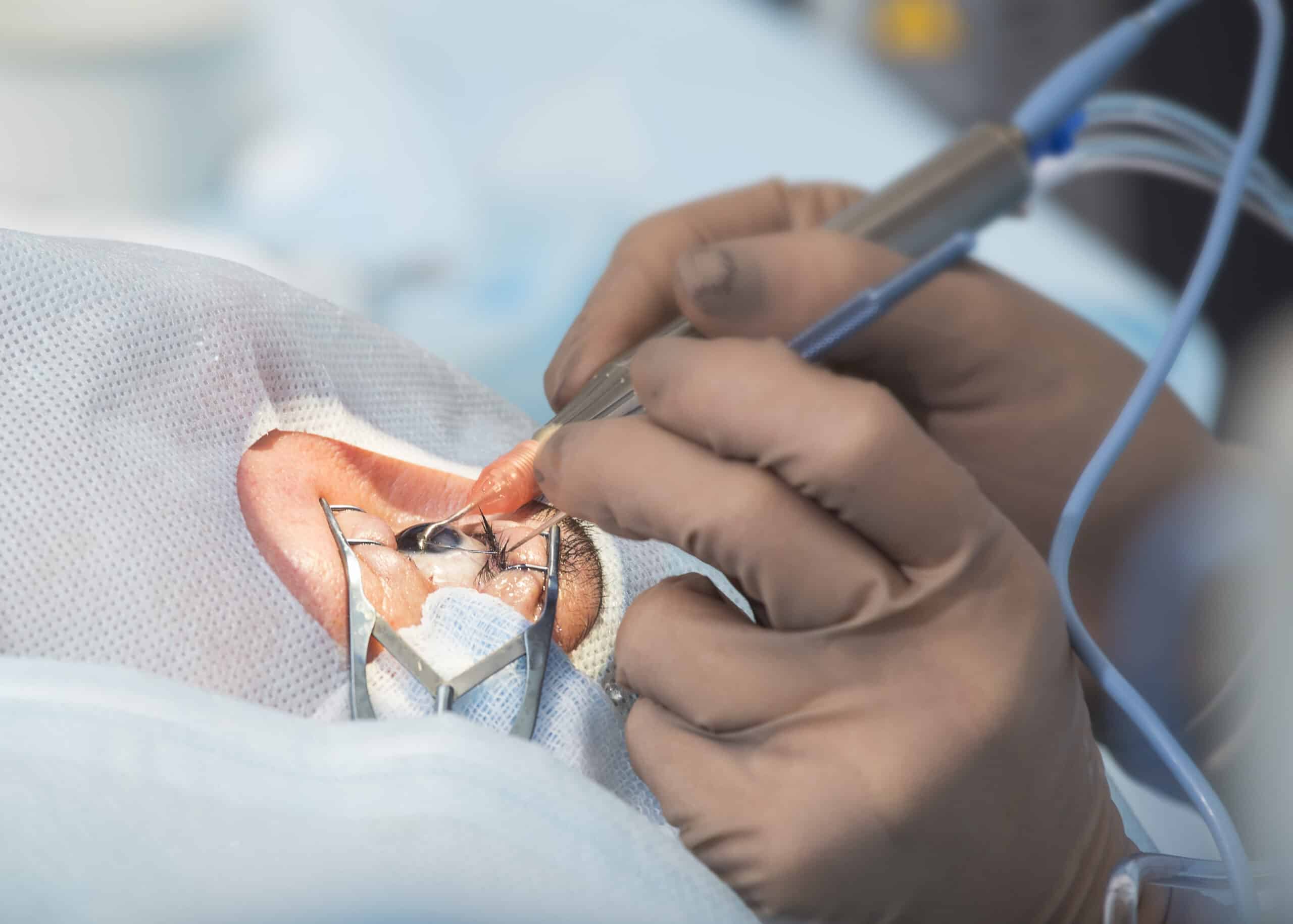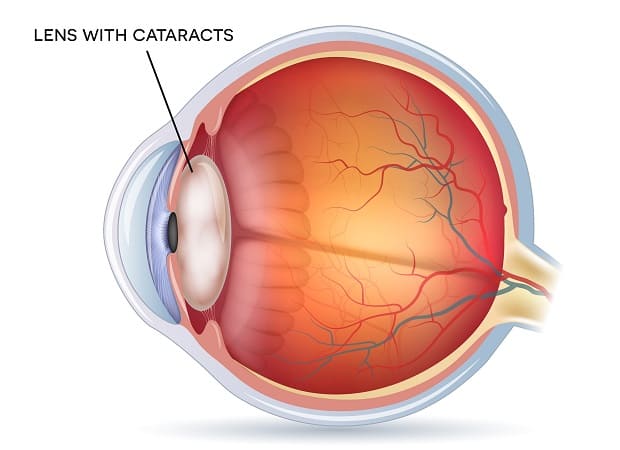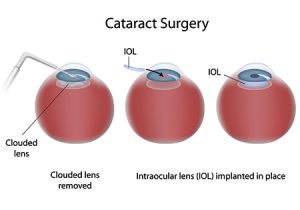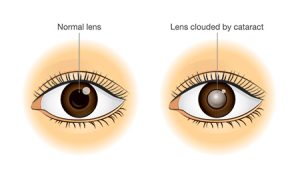
Cataract Surgery
For St. Petersburg & Clearwater, FL
A cataract is the clouding of the eye’s lens. It is a common problem related to aging. In fact, by the time Americans reach age 75, about half of us will have cataracts to one degree or another. It’s important to schedule an eye exam as soon as you notice signs that you are developing cataracts because this is a progressive condition that won’t improve by itself. If you do have a cataract, you need not be alarmed, however. Because cataracts are so common, surgery to correct this condition has been extensively tested and improved over the years and is now a fast, out-patient procedure. At St. Michael’s Eye & Laser Institute in Largo, Florida, we have performed cataract surgery for thousands of patients in the Tampa Bay area since our founding in 1961. Patients who reported that cataracts were impeding their vision now experience newfound joy in activities like reading, watching TV, or simply admiring a sunset.


Symptoms Of Cataracts
At first, a cataract may have little effect on your vision, but as the cataract grows, you may notice changes such as:
- Haloes or starbursts around lights at night
- Dimming daytime vision
- Worsening nighttime vision
- Blurry vision
- Double vision in one eye
- Frequent changes in eyeglass prescription
- Increased sensitivity to light
- A need for brighter light when reading or working
Although cataracts usually occur later in life, there are other types of cataracts that can show up earlier. If you notice the above symptoms at any age, you should schedule an eye exam so that your eye doctor can monitor the progression of your cataract and recommend corrective surgery at the right time.

How Cataract Surgery Is Performed
A cataract operation is a simple, relatively painless procedure that takes an hour or less to perform. Surgery is done on one eye at a time. First, the clouded lens in your eye must be removed. Your surgeon will do this by making a tiny incision in your cornea and inserting a special tool that uses ultrasonic energy to break up the clouded lens. Your surgeon will then remove the pieces through the incision. After that, the surgeon will implant a clear, artificial lens by rolling it up and inserting it through the incision. The lens will unroll once it is in place.
Cataract Surgery Recovery
You will need to protect your eye according to your doctor’s instructions for up to a week, and use prescription eye drops to prevent infection. You will probably notice that your vision is clearer immediately. (In fact, some lenses used for cataract correction can correct your vision, too.) It takes about a month for your eye to heal completely after a cataract operation.
Types Of Intraocular Lens Implants (IOLS)
You have many choices for IOLs with cataract surgery or clear lens exchange. These implants can correct your vision for one or multiple focal distances so you can enjoy a life free from prescription eyeglasses and contact lenses.
Monofocal IOLS
The monofocal IOL is the traditional option for cataract surgery that your insurance provider covers if you carry vision coverage. Monofocal lenses correct for near or distant vision, but most people choose distance vision to address their myopia (nearsightedness).
Premium IOLS
Premium IOLs offer better eyesight for nearby, intermediate and/or distant objects. These advanced lens implants are your best option for achieving perfect or near-perfect vision. Multifocal lenses address nearsightedness, farsightedness and astigmatism so you can read fine print and take in beautiful scenery without corrective eyewear. Accommodative lenses work to provide clear vision for close-up, intermediate and distance, especially in nighttime and low-lighting environments.
Panoptix
PanOptix trifocal lens implant is the only FDA-approved trifocal lens that provides better vision for nearsighted, farsighted and presbyopic patients with or without astigmatism. These IOLs can eliminate reading glasses and offer brighter eyesight with more vivid colors and contrast.
Our eye surgeons will discuss your IOL options during your consultation and eye exam at our Largo, Florida, office. The right IOL for you depends on your lifestyle and vision needs.
Patient Reviews Of St. Michael’s Cataract Surgery
“Staff at St Michael’s Eye & Laser Institute are all very professional, courteous, & knowledgeable. I experienced virtually no pain before, during, or after my surgeries. I appreciate Dr. Michaelos’ skill & how comfortable he made me feel, reducing any anxiety I was feeling.” – Cindy Lou Harris, Patient.
“Wow! What a staff of dedicated professionals! I’ve been nothing short of totally impressed with the treatment I’ve received so far from Dr. Michaelos and his team! My journey with them isn’t over, but I’ve never had my eyes checked so thoroughly in my life. If anyone is seeking a top quality ophthalmology suite, this office is worth making an appointment with.” – Debbi X, Patient.
“Dr. John is a caring and compassionate man who really cares about his patients. He is an excellent Dr. who does excellent work. I highly recommend him for any procedure! I will never go to another Dr. for eye surgery. My right eye sees better than it ever has in my life after cataract surgery.” – Daniel Van Hoven, Patient.
Cost Of Cataract Surgery
Cataract surgery can have a wide price range because several factors are at play in the total cost. Insurance companies typically cover cataract surgery expenses with a basic monofocal lens. However, if you choose a premium or advanced IOL, you will have additional out-of-pocket costs.
St. Michaels Eye & Laser Institute offers financing options to help you improve your vision and eye health with affordable payments and can help you navigate issues with your insurance provider. Our staff can provide you with a detailed cost estimate for cataract surgery.

Cataract Surgery Benefits
More and more people are choosing to have cataract surgery before the clouded lens causes significant vision loss and because of the many benefits the procedure affords.
The advantages of cataract surgery include:
- A Quick Procedure: Cataract surgery takes approximately 10-30 minutes to perform, depending on the density of the cataract, and the entire visit typically takes around two to three hours.
- A Simple Recovery: Your eyes heal quickly after cataract surgery. You’ll notice clearer vision right away, with your eyesight stabilizing about one to three days after the procedure. Complete recovery may take a month or longer.
- Better Vision: In addition to clear vision after the cataract is removed, premium IOLs can reduce or eliminate your need for prescription glasses, contact lenses and even reading glasses.
- Improved Quality of Life: Cataracts can impact many areas of your everyday life. As the clouded lens gets denser, you may experience balance issues, double vision and light sensitivity and are more at risk of falling and getting into an at-fault auto accident. Cataract surgery can restore your quality of life with clear, crisp eyesight.
- Protect Your Eye and Overall Health: Cataracts are a leading cause of blindness worldwide, but they are curable with cataract surgery. Worsening cataracts put you at risk of injury due to your limited vision and decreased contrast sensitivity. Cataract surgery gives you visual clarity to go about your everyday activities safely.
Contact St. Michael’s Eye & Laser Institute
St. Michael’s Eye & Laser Institute performs cataract surgery on patients of any age. If you’re concerned that you may have a cataract, please don’t hesitate to contact us. As a family-owned surgery center serving Largo and other Tampa Bay communities for three generations, we’re staffed with skilled physicians committed to offering the highest standard of patient care with a personal touch.
Cataract FAQs
How is laser cataract surgery different from traditional cataract surgery?

Can cataracts return after I have surgery?
Cataract surgery is effective for the rest of your life. Because IOLs are designed to last forever and cataracts cannot develop on an artificial lens, you should not need to undergo surgery again.
Does cataract surgery hurt?
Because your surgeon numbs your eyes prior to surgery, you should not experience any pain during the procedure, although you may notice some pressure on your eye. Later, you may feel some discomfort in your eyes during your recovery, but pain medication can relieve that.
At what age should I start worrying about cataracts?

Is it possible to prevent cataracts?
While the medical community is actively studying cataracts, the precise cause remains unknown. What research can tell us is that smoking, exposure of the eyes to ultraviolet light, hypertension, obesity, and aging are significant risk factors in the development of cataracts. Eating nutritious food, wearing sunglasses, and quitting/not starting smoking may help you avoid cataracts, in addition to keeping your whole body healthy.
How soon will I be able to see clearly after cataract surgery?
You are likely to be able to see more clearly immediately following your surgery since you no longer have a cloudy lens impeding your vision. However, full recovery can take several days to a few weeks depending on your body’s ability to heal, so you will notice gradual improvement to your vision during this time span.
Can I drive myself home after cataract surgery?
Although your improved vision may give you the confidence to want to drive home after your surgery, you should arrange to have someone else drive you home from your surgery because the effects of the anesthetic and sedative may not have worn off completely. The good news is that many patients are cleared to drive within two or three days.
Is cataract surgery necessary?
Cataracts are not life threatening, so surgery is not a necessity. However, cataracts progressively get worse, often to the point where you have difficulty driving, reading, and seeing at night. Ultimately, you must decide if you want to tolerate cataract-related vision impairment. At St. Michael’s Eye & Laser Institute, our patients are always glad they had surgery because of how much easier it makes their lives.
 Patient Portal
Patient Portal  Online Payment
Online Payment  Doctor Referral
Doctor Referral  Financing
Financing 

